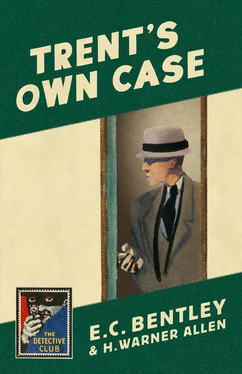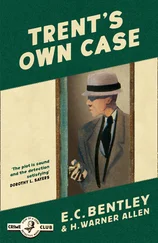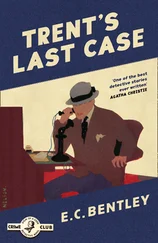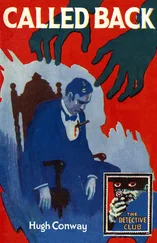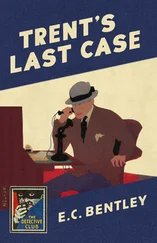Miss Yates smiled whimsically. ‘When I decided! It was Eunice who made up her mind to adopt me—you know it was. Why she did, I don’t suppose she knows herself.’ Miss Yates turned the discussion to her plans of travel, and to the changes wrought in Rome since the eighteen nineties. Trent’s own arrangements for the immediate future came under review. Early next day he was going down to Glasminster to attend the wedding of Julian Pickett. Perhaps Aunt Judith remembered Julian. Of course Aunt Judith did. He was the young fellow who had had a limp ever since a tiger bit him somewhere in the Himalayas.
‘In the gluteus maximus ,’ Trent murmured.
‘I knew it was somewhere like that,’ Aunt Judith said. ‘Yes; and the day you brought him to see me he rolled up a sheet of music and made a noise like a panther through it, so that Elizabeth dropped the tea-tray in the pantry, and had to be given sal volatile.’
At 8:15 Miss Yates was installed in her place, continuing the conversation through the open window. At 8:19¾ a man carrying a kit-bag hurried past the barrier. He fled to the first-class Pullman, and leapt in just as the train began to move. He was standing in the doorway, with the attendant hauling in his bag, when he chanced to turn and look Trent straight in the face.
Trent, whose casual glance had seen in him only an unknown individual in a big coat over brown tweeds, and a soft hat well pulled down, uttered an exclamation. ‘Bryan! By Jove, you nearly missed it!’
‘Phil! You here!’ With a wild gesture the man leaned from the receding coach. ‘Why the devil …’ The rest of his shout was drowned in the rumble as the train gathered speed. Trent, in his astonishment, barely remembered to reply to his aunt’s wave from the window.
What could be the meaning of Bryan Fairman’s state of agitation? Why had his friend, usually so strictly self-controlled, looked and acted like a demoralized and desperate man?
CHAPTER II Contents Cover Title Page Copyright Introduction I. SOUTHWARD BOUND II. A LITTLE SHEET OF PAPER III. DEATH OF A PHILANTHROPIST IV. NOT HARD OF HEARING V. TRENT IS TAKEN ABACK VI. AN ARREST HAS BEEN MADE VII. ON A PLATE WITH PARSLEY ROUND IT VIII. THE WHITE FLOWER OF A BLAMELESS LIFE IX. THE TIARA OF MEGABYZUS X. A MATTER OF TEMPERAMENTS XI. IMPASSE XII. THE COUNT EXPLAINS XIII. FELIX POUBELLE 1884 XIV. GENIUS MUST LIVE XV. EUNICE MAKES A CLEAN BREAST OF IT XVI. THE WHISPERED WORD XVII. FINE BODY OF MEN XVIII. INFORMATION RECEIVED XIX. RESURRECTION XX. A GOLF MATCH XXI. AUNT JUDITH KNITS The Detective Story Club About the Publisher
A LITTLE SHEET OF PAPER Contents Cover Title Page Copyright Introduction I. SOUTHWARD BOUND II. A LITTLE SHEET OF PAPER III. DEATH OF A PHILANTHROPIST IV. NOT HARD OF HEARING V. TRENT IS TAKEN ABACK VI. AN ARREST HAS BEEN MADE VII. ON A PLATE WITH PARSLEY ROUND IT VIII. THE WHITE FLOWER OF A BLAMELESS LIFE IX. THE TIARA OF MEGABYZUS X. A MATTER OF TEMPERAMENTS XI. IMPASSE XII. THE COUNT EXPLAINS XIII. FELIX POUBELLE 1884 XIV. GENIUS MUST LIVE XV. EUNICE MAKES A CLEAN BREAST OF IT XVI. THE WHISPERED WORD XVII. FINE BODY OF MEN XVIII. INFORMATION RECEIVED XIX. RESURRECTION XX. A GOLF MATCH XXI. AUNT JUDITH KNITS The Detective Story Club About the Publisher
MISS Yates, for her part, had not perceived this brief scene of recognition, and she applied herself now, very contentedly, to the taking of things as they came. She observed that, as the train drew out of the station and gathered speed, there was a change in the atmosphere of the carriage. Passengers who had been painfully absorbed by long-drawn-out farewells pulled themselves together. They became more jaunty and less self-conscious. They were on the threshold of something like another existence, in which for a time they would be freed from the conventions of their environment and from neighbourly inquisition. Consciously or unconsciously, they hoped to be really rather more themselves. Moreover, they were southward bound, leaving fog and drizzle behind them. There was the sense of relief which doctors have in mind when they use the tactful expression ‘change of scene.’
With a smile, Miss Yates settled herself in her place and looked round the carriage. There was a slight touch of luxury about it all which she found extremely soothing. The menu did not look exceedingly inviting, but to her there was a certain sense of adventure about dining in the train. And the man was so delightfully polite, particularly after she had ordered herself half a bottle of burgundy.
As dinner was served, she began unobtrusively to take note of her fellow-travellers, and build up for herself an imaginary picture of their lives. For Miss Yates had a keen curiosity about all strangers with whom she came in contact, and it amused her to fit each of them with a personal history. Sometimes she enjoyed the additional pleasure of contrasting her guesses with the later-appearing facts.
She had little hesitation in measuring up the tall, straight-backed, distinguished man, carefully dressed and with well-tended grey moustache, who sat nearest to her, reading a magazine. Not quite military, she decided; a more thoughtful type. Something diplomatic, undoubtedly; perhaps a newly-appointed ambassador or minister. Her conjecture would not have pleased the object of it, who prided himself on looking every inch a soldier. He was in fact a very eminent professor of history, on his way to Tunis, where he hoped to establish new facts about the battle of Thapsus that would blast the reputation of another eminent historian, whom he had been after for years.
Miss Yates was not much nearer the mark in placing the well-groomed young man of magnificent physique who came next under her eye. She thought the slight crookedness of his nose rather added to his attractiveness; too regular features often went, she had found, with an undesirable vanity in men. Some people might think his chest and shoulders over-developed, but that was often the case with rowing men, who were usually very nice boys; and Miss Yates thought of this youth as a Cambridge undergraduate going to join his parents abroad. His clothes were certainly quite right. At dinner he displayed a very healthy appetite, and drank only a little mineral water, while he happily studied a letter which Miss Yates surmised to be from a girl. She wondered what the young man could have been doing to his left ear.
The state of that organ, alas! was none of the young man’s doing. Miss Yates was looking at the beginnings of what is known as a cauliflower ear, the work of Baker Isaacs of Hoxton; and the youth himself was Gunner Brand, formerly heavy-weight champion of the army, holder of the Abingdon Belt, winner of a series of lucrative professional battles, and looking forward to a contest for the world title in three months’ time. He was on the way to join his trainer at their camp in Cap d’Antibes, and was now reading and re-reading a long letter from his fiancée, whose equal the world did not, in his opinion, contain.
Miss Yates was less at fault in her judgment of the neighbouring couple. Her quick glance took in a multitude of details of expression and turnout. The very pretty girl she set down unhesitatingly, and quite correctly, as a vain, selfish and bad-hearted fool. Her manner to the waiters as the train dinner was served appealed to Miss Yates as the very acme of the sort of hauteur represented in American films of English high-life. The young man, evidently her lately married husband, was a weak but not unamiable fool. Their whole appearance bespoke considerable wealth; and Miss Yates reflected, not for the first time, on the dangerous extent to which complete worthlessness is represented among the rich.
She understood best of all, perhaps, the kind of man who had so narrowly escaped missing the train. She liked his face, with its clean-cut lines and cloven chin. About thirty, she said to herself; an earnest type; a trained mind and a worker; perhaps a doctor; normally well controlled, but now showing signs of illness and all but ungovernable agitation. There was something reckless and haunted about his appearance. The term ‘Byronic’ occurred to Miss Yates’s unmodern mind. Was he, perhaps, suffering from a broken heart? Miss Judith believed in broken hearts, though she had learned that they can be broken in more ways than one. Certainly this man was desperately worried about something. He ate but little at dinner, and he drank a whole bottle of champagne without any visible improvement of his spirits. His hand shook as he raised his glass. Miss Yates wondered if he were flying from justice; but she could not think him an evil-doer.
Читать дальше
